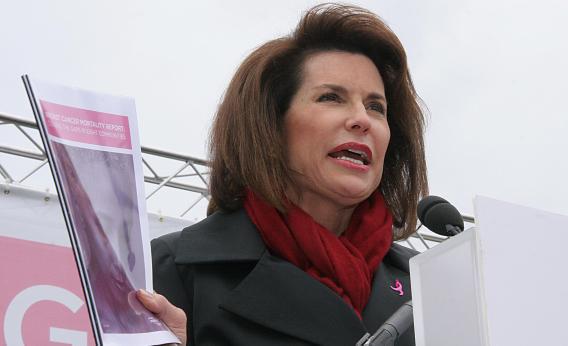Many months after the blow-up that occurred when Susan G. Komen for the Cure caved to anti-choice pressure and cut off grants to Planned Parenthood for breast cancer screening, CEO Nancy Brinker and president Liz Thompson have decided to step down from their leadership roles in the organization. (Brinker will continue on in a different role, with an emphasis on fund-raising and strategy.) Komen did restore the grants to Planned Parenthood after the furor, but the question of whether or not they could recover from the publicity disaster lingered. They got their answer in June, when turnout for the annual fundraising race went down dramatically, by as much as a third in some cities.
So, will the resignations do much to fix Komen’s woes? Doubtful. If Brinker had resigned in the midst of the uproar, it could have had an impact, but since this is eight months after the initial controversy, it’s unlikely that many people will even notice. To make things worse, Republicans continue to look for other ways to attack women’s access to basic reproductive health care, especially contraception. Being in the midst of a heavy political battle will make it that much harder for Komen’s base, i.e. people who care about women’s health issues, to worry too much about forgiving an organization that so recently betrayed them.
Part of why Komen is likely to fail at picking up the pieces is that the entire battle exposed some tensions in its base of support—tensions that had largely been minimized by the genuine desire of a broad coalition to fight breast cancer. Part of what made the organization such a behemoth is that Komen was able to put together the traditional supporters of women’s health care, who are pro-choice and have feminist leanings, with more conservative women who had previously been afraid of the immodest implications of talking openly about breast health. They did this by pointedly desexualizing the issue in a sea of pink ribbons and teddy bears, something the more feminist supporters could ignore because of the greater good. Prior to the Planned Parenthood debacle, Komen seemed largely apolitical—not outwardly judging those of us who want comprehensive health care that includes an adult understanding that people are going to have sex. By crossing that line, they forced their supporters into a sluts vs. church ladies battle. Now the feminist side perceives the organization as swarming with prigs whose support for your health stops as soon as they know you’ve touched a penis, and a handful of prominent resignations can’t really do much to change that.
